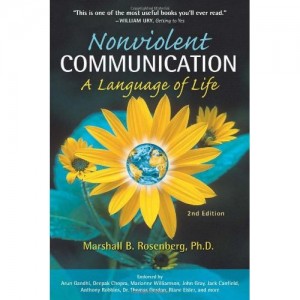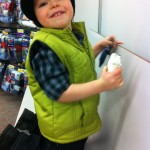
After I checked out Nonviolent Communication by Marshall Rosenberg from my library, I knew I would need to buy it for my personal collection. It is excellent. Not only is NVC extremely relevant to parents working towards healthy relationships with their children, but the principals are applicable in any type of communicative relationship….spouses, family members, co-workers, employers, neighbors, and just about anyone with whom we may potentially have disagreements once in a while.
For those of you who aren’t familiar with NVC, know that this approach to communication is a cornerstone of attachment parenting. Here are the concepts of NVC in a nutshell: it is about feelings and needs. It’s about setting judgement aside and focusing on communicating how we feel and what we need.
While the book is an inspiring read, it can be difficult to put to practical use…at first. It was difficult for me in the beginning because I wasn’t used to communicating this way (effectively). But right away, even for the novice “nonviolent communicator,” it’s easy to start with small steps simply by raising awareness of critical moments in your daily communications; those when it would be easy to impart judgment on a situation. Instead of judging, I try to re-think my viewpoint and re-phrase my words to be as objective as possible.
What I See: So instead of walking in to the living room and saying, “Oh, what a big mess in here,” I keep my observations clear and straightforward. “I see books, blocks, scarves, and trucks spread on the floor from wall to wall.”
How I Feel: “I feel tired because I’ve picked up these toys two times already today.”
What I need: “I need order in this room, and I need help to make it happen.”
Will You? “JJ, will you please put the scarves in the basket? Elia, will you put books back on the shelf please?”
What could easily have started as a judgment (Why are you so messy?), confrontation (You never put your toys away!) and demand (Get this cleaned up now!), turns out to be a cooperative activity, and my need for order is met.
I realize that with toddlers and very young kids, it may be difficult to get immediate cooperation with respect to a person’s needs. As my kids grow, NVC gets more and more effective, and I especially love it for my husband’s and my interactions. What takes practice is the ability to distance ourselves from any personal attacks and look for specific feelings and unmet needs.
Anyone new to NVC can start practicing the tactics intermittently. If I have an observation, feeling, need, or request to convey, I practice stating it nonjudgmentally in as many situations as I can, whether or not there is anything else to express about it. For example, at breakfast this morning I said, “I see Elia using a fork and JJ sitting down in his chair,” just to practice statements of observation. To my husband I said, “I feel nervous about my meeting today.” Or, while making cookies today, “I need the eggs cracked in this bowl.” Or, this evening, “JJ, would you pick out your nighttime diaper?” All of those events happened independently and did not result in extensive communication, but they gave me a chance to identify and verbalize a sight, feeling, need, and a request. I continue to look for small moments like those to help me practice.
Right now, I have to sort through my emotions and think hard about articulating my feelings and needs. It is common for me to say how I “feel” without really stating a feeling. For example: “I feel like you’re not listening to me.” This statement does contain the word “feel,” but it’s really an accusation, not a true description of how I feel. I feel insecure. I feel discouraged. I feel angry. Those are more accurate descriptions for how I feel when my need to be heard isn’t met. The Center for Nonviolent Communication offers lists of common feelings and needs that I refer to often!
Regarding NVC, I also like that only one person in a communication exchange needs to be familiar with the principals to make it effective. So I can help someone else (like my children) identify their feelings and needs and feel successful in communicating them. “Oh, Elia, I see that you lost your dinosaur toy! That must make you feel sad…you loved watching him hatch and grow! Do you need a hug? I’m sorry that he’s gone. How about if we look for another dinosaur egg the next time we go to the store?” By offering suggestions or making guesses as to what she is feeling, it gives her a chance to correct me–“No I’m not sad, I’m mad!” This creates a more meaningful conversation and is teaching my daughter effective, empathic communication.
If you haven’t read NVC yet, check it out, and you can join me in my ongoing efforts to practice it! Effective communication is excellent.






